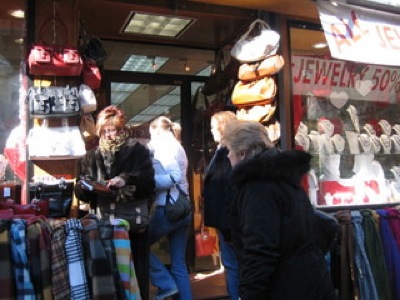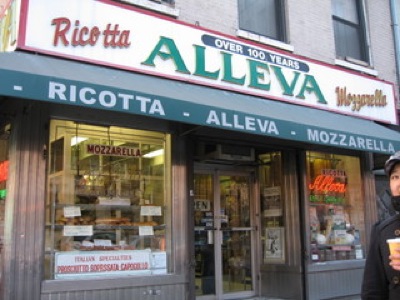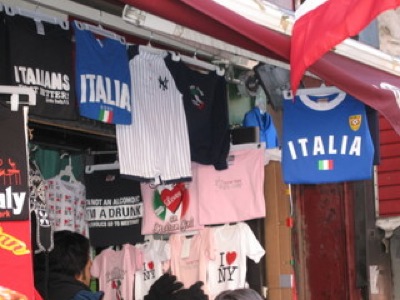Little Italy: What's Real
From Decoding New York
| Introduction |
| Little Italy |
| * Evolution |
| * Here v. There |
| * Economy |
| * What's Real |
| Koreatown |
| * Evolution |
| * Here v. There |
| * Economy |
| * What's Real |
| Comparison |
| * Photo Gallery |
| * Sources
|
Once, Little Italy served as an ethnic enclave for Italian immigrants. New immigrants would arrive and live in tenement buildings and set up shop in the vicinity. Immigrants had an "authentic" experience as they lived the Italian culture by sticking true to what they knew. Today Little Italy is primarily a tourist area. People from various backgrounds come to Little Italy for fine Italian dining and trinkets such as Italian shirts and other gifts. Little Italy is now more Americanized as English is typically spoken and seen.
To get the full impact of what is Little Italy, we need to observe both insider and outsider perspectives. The "insider" perspective comes only from people interviewed in restaurants of fine Italian cuisine and traditional Italian bakeries and pizza places. The “outsider” perspective comes from tourists. With these different observations we will view what people think of the neighborhood called Little Italy and whether or not the stereotype: "Little Italy is in Chinatown" is accurate.
The most valuable information comes from the primary source. To truly understand Little Italy, we must hear about Little Italy from the people who make up Little Italy, the workers, the residents, and the tourists. These are our "primary sources."
“Inside” Perspective
Anton Rica or Toni
Anton Rica was born and raised in Albania before he came to America. He speaks Albanian, Italian, Spanish and English. (He taught himself how to speak various languages in order to adapt socially and economically). On his adjustment in learning the English language, Anton says that Albanian is “Totally different from English.” He is a United States citizen, manages a restaurant in Little Italy, and supports his family in America and they all speak Albanian. When asked if he has returned to visit Albania, his reply is affirmative. According to Anton, the "Planet is changing" which is comparable to the changes he has witnessed in Little Italy. People come and go and he has adapted to these changes in order to survive. When asked who he thinks brings changes in the neighborhood, Anton replies “It doesn’t depend on me.” According to Toni, the tourists are the ones that bring change to Little Italy. What they want, he gives. It’s all about making money and staying afloat. The types of people he has noticed in Little Italy come from all over the world. His own staff is from differing backgrounds.
Robert Alleva
Robert Allerva was born in the United States. His family has been in America for 115 years ever since his great grandfather came in the 1890’s. He is considered fourth generation and has been here for 30 years. He owns Ricotta Alleva, a shop that was passed down to him and could possibly be passed down to his son as a family-owned business. His store sells various Italian imported goods such as pasta, oils, cheese, meat, etc. On his relationship with other owners nearby, Alleva states that they, “Take care of one another and help out.” This demonstrates a degree of closeness amongst neighboring business owners. According to Alleva, Little Italy is a safe neighborhood. He knows just about everybody (referring to other store managers and locals). On how Little Italy has changed he says, “Little Italy is more commercial now, people that lived here have moved to the suburbs.” Little Italy has shrunk and the area is mostly made up of restaurants, stores and cafes. He doesn’t speak Italian, although he feels he should know it, “Everyone wanted to speak English, not Italian…it just fell out that way.”. His family did not want to be considered immigrants when they came to America so they didn’t try to preserve the Italian language. Italian is no longer useful to him is because he no longer has relatives in Italy with whom he needs to communicate. He doesn’t need to speak Italian because his entire family is here and everyone knows English. They have family debates on the issue of identity. He considers himself American because he was born and raised here. When he refers to himself as Italian, Alleva's children, “Rip me apart and tell me I’m American.”
Ralph
Ralph was born in the United States. He is second generation. His father came from Bari, Italy. Both his parents speak fluent English. He runs his own business: Florio’s Restaurant. Ralph has been in Little Italy for 35 years. He likes Little Italy for "the activity, people come and go, and meeting different people." Little Italy has changed since the time he was here, “Little Italy became Little Chinatown. We’re a suburb of Chinatown.” Residential buildings in Little Italy are being rented out to Asians. Even so, he does not believe that tension exists between the Italians and Chinese. He himself has hired two Chinese barmaids. Today he says 70% of the people in Little Italy are tourists. Tourists are the people who are keeping Little Italy alive as the area is becoming more commercial. When asked to identify himself, he refers to himself as Italian-American. He only has a few relatives left in Italy. He has visited a few times but hasn’t been there long enough to know if he likes it enough to ever move there. He speaks Italian but his children don’t. However his grandchildren do. On his thoughts about maintaining individual culture, Ralph believes that “Every culture should be preserved, no matter what culture.” He celebrates all his traditional holidays and other holidays including Chinese New Year. In his 35 years in Little Italy, there are a few things he would like to see changed: to have Little Italy cleaned up a bit and for rent to be lowered because rent is high especially considering some apartments have showers in the kitchen.
Ernesto Rossi
Rossi was born here. His grandfather came to America in the 1900’s from Naples, Italy. His grandfather came to Little Italy and worked for an uncle. They eventually opened their own store which moved around a lot due to high rents. In time, the store was passed down to him. He sells music sheets, records, gifts, novelties, religious articles, and other supplies. His customers are mostly tourists. Not many Italians still live in Little Italy since their children move out to better themselves. According to Rossi, Little Italy has changed. It was more of a neighborhood during his childhood. He recalls playing kickball on the streets and knowing all his neighbors. Now he doesn’t know all the residents because they change quite frequently. When asked to identify himself, Rossi says he is Italian-American but his allegiance is to America. According to Rossi,“Little Italy is in the center of everything.” It’s a place where he can see people from different cultures and “I believe maintaining culture is very important.” For example, he says “the San Gennaro festival is part of New York. All these things should be preserved.” Rossi hopes to maintain other cultural and historical aspects of Little Italy. He would like to see a creation of a museum, documenting the history of Little Italy. He wants Little Italy to keep on going and not to fade away. He also would like government to lower rents so that people aren’t forced out.
Elizabeth
Elizabeth was born in Peru. She came to America 23 years ago because the situation in Peru wasn’t good. She applied for jobs in Little Italy and an Italian girl taught her how to do everything. She taught herself English and learned to speak Italian from work. The store she works in supplies restaurants in Little Italy. In reference to her Peruvian roots, culture is important to her. She teaches her children Spanish so that they can communicate with her family. She goes back to Peru every year. On describing Little Italy, Elizabeth says that it is “Famous because of restaurants, it’s what keeps Little Italy alive.” People come back for food and shops. Little Italy is a tourist attraction. On her views of the changes in Little Italy, she replies that “Tradition not kept us as much as before.” Tradition is fading with each generation. She believes it is hard to preserve traditions, because younger generations are moving out due to high rent and also because buildings aren’t up to date. For example, some older buildings lack elevators. “Rent is too high. It is difficult to live here, not very affordable. But not much needs to be changed. I like this neighborhood. I’m really happy being here.”
Patrycja Azarczyk
Patrycja was born in Poland. She came to the United States in 1991 when she was nine years old. Her family came here for a better life, to make more money. She is not a citizen yet but she has her green card and plans to apply for citizenship. She was referred to her current job by a friend. She likes the neighborhood and wouldn’t change a thing about it. She loves that the neighborhood has a variety of people,“The people that I see here are a lot of Asian people and Italian people because this is Little Italy. My customers are Italian, Asian!”. Since her stay in America, she has gone back to Poland to visit family there and wouldn’t mind moving back if she had the money. She practices her culture, stating “I am Polish, I do think its important to preserve your roots and culture because that is where you are from and you should be proud of where you are from.” She would want her children to speak Polish. She loves diversity. As a matter of fact she has a Jamaican boyfriend and she refers to her boyfriend and herself as “Platano y Polish sausage.”
Christy
Christy was born in the United States. She lives in Little Italy and likes it there. She also works in Little Italy and her customers are Chinese and Italian. She believes in maintaining her Chinese culture and speaks Chinese fluently.
“Outsider” Perspective: Interviews at Grotta Azzora Restaurant
We talked with tourists from Spain. Javier sees Chinese, Italians and Americans in Little Italy. Jaime Nunez thinks Little Italy is very beautiful. Emilio thinks Little Italy is very small. He sees mostly Chinese and Americans. He believes that it is important to preserve your culture.
The "insider" perspective goes into greater depth about how Little Italy came to be and how important or not important it is to maintain the Italian culture. A common theme that appears among the "insider" perspective is the traditional immigrant path. A member of the family would venture to America, settle in Little Italy, make enough money to bring their family over (assuming the family did not arrive together) and remain in America. The reasons for immigration are also quite common. Immigrants come to America to escape political, economic, or social turmoil in their home country in order to better their lives and find opportunities not available to them before. Another common practice that is seen in Little Italy is the passing down of family-owned businesses. Some businesses have been around in Little Italy through several generations. From the interviews conducted, the general consensus is that Little Italy is well liked for its diversity of people and the communal cooperations. If it weren't for the rising rental rates, Little Italy would be fine the way it is.
In contrast, to the detail with which business owners and employees could comment on their knowledge and view of Little Italy, tourists had little to say about Little Italy's history. Tourists replied that they liked what they had seen of Little Italy. The food was good and the people were nice. It was just unfortunate, that Little Italy was so small in size.



